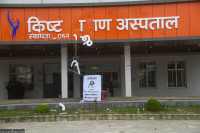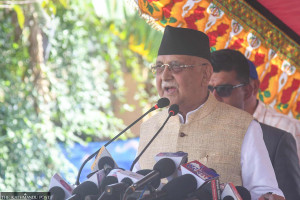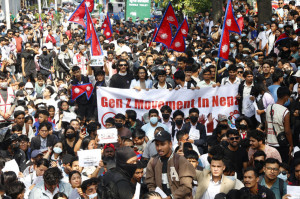National
Bill seeking legalisation of cultivation and consumption of medical marijuana registered in Parliament
The bill, registered privately by a ruling party lawmaker, seeks to reverse a 50-year proscription on the cultivation, consumption and sale of marijuana..jpg&w=900&height=601)
Binod Ghimire
Five decades after the Nepal government criminalised marijuana cultivation and consumption, a private bill has been registered at the House of Representatives seeking the legalisation of marijuana, primarily for medical use and for export.
The private bill registered by Sher Bahadur Tamang, a Nepal Communist Party lawmaker and former minister for law and justice, envisions permitting licenced farmers to cultivate and sell cannabis.
According to the bill, any farmer with a desire to cultivate marijuana will be able to acquire a licence from the local government or the respective district after specifying the area of cultivation, the people involved in the cultivation, and an assurance against unauthorised use.
The bill proposes the formation of a 14-member Marijuana Board led by the health secretary to regulate and manage the cultivation and sale of marijuana. Similarly, it also envisions a regulatory body at the district level, led by the chair of the District Coordination Committee. Producers will be able to sell their products to medical companies as prescribed by the board, to people authorised to consume marijuana for medicinal purposes, and to authorised agents for export to other countries.
“Cultivation will primarily be for export to the international market,” Tamang told the Post. “Nepal can earn billions of dollars annually from such sales.”
This is not the first time that marijuana has come up in the federal Parliament. Earlier in February, Nepal Communist Party lawmaker Birodh Khatiwada had tabled a proposal at the Parliament Secretariat for a discussion over the legalisation of marijuana cultivation. The proposal had been supported by 45 other ruling party lawmakers.
The global legal marijuana market is expected to swell to a $73.6 billion industry by 2027, with the medical marijuana segment accounting for more than 70 percent. The unrefined and unprocessed marijuana market was valued at $9.1 billion in 2019, with more than 88 percent of revenue limited to North America.
Citing the US state of California as an example, Tamang said that marijuana exports could help improve the country’s trade imbalance. The annual trade of marijuana in California’s legal market crossed $3.1 billion last year.
Various historical records suggest that the cultivation and sale of cannabis were legal in Nepal till the early 1970s. But when hippies from the Western countries flocked to Nepal in the late 60s and 70s as part of the overland hippie trail, they brought with them a commercialised demand for the country’s marijuana and hashish. That new market also invited undue attention.
Both domestic and international researchers allege that it was pressure from the United States, which was then in the midst of its ‘War on Drugs’, that led Nepal to criminalise the cultivation, sale and consumption of cannabis. In 1976, the Narcotics Drug Control Act criminalised the sale, cultivation and consumption of cannabis. Marijuana cultivation now attracts a jail term of three years and up to Rs 25,000 in fines. Similarly, marijuana trafficking can lead to 2 to 10 years in jail and a fine of up to Rs1,000.
Today, 11 American states, and the District of Columbia, have not just legalised medical cannabis, but also its recreational use. Numerous countries across the world have legalised medical marijuana, with a handful permitting recreational use.
Tamang’s bill also proposes jail terms of up to a year and fines up to Rs100,000 for cultivating without acquiring a licence.
While Tamang says that the bill has been prepared in consultation with legal and economic experts along with medical doctors, those who have studied marijuana say that more research is required before allowing commercial cultivation.
“Not all marijuana strains have proper medicinal value,” said Ranta Thapa, a former professor of agriculture at Seoul National University. “Only plants with the proper quantity of tetrahydrocannabinol (THC) should be allowed for plantation.”
Thapa and his team are researching the use of THC, through the consumption of honey made from marijuana flowers, in cancer prevention and treatment.
The bill registered by Tamang needs to be presented before Parliament for deliberation and a majority of the lawmakers have to own it for endorsement. As a private bill, lawmakers are less likely to endorse it.
The bill on Management and Monitoring of Marijuana is the first law registered by an individual lawmaker since the promulgation of the constitution four years ago. Records at the Parliament Secretariat show that just three private bills have been endorsed by Parliament since the restoration of democracy in 1990.
A private bill, in contrast to a public bill, is a bill introduced by an individual lawmaker rather than the minister. Private bills reflect the concerns of the lawmaker or a political party while public ones reflect government policy.
Tamang, however, is confident.
“A majority of lawmakers, irrespective of their parties, have congratulated me for the bill,” he said. “I am very confident it will get endorsed.”




 18.12°C Kathmandu
18.12°C Kathmandu















